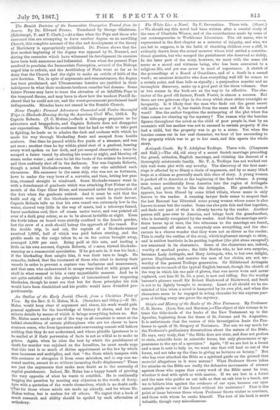Never Caught: Personal Adventures Connected with Twelve Successful Trips in
Blockade-Running during the American Civil War, 1863-4. By Captain Roberts. (J. 0. Hotten.)—Such a title-page prepares us for adventure and braggadooio, and Captain Roberts does not disappoint our expectations. While he confesses that he had no wish to take part in fighting, he leads us to admire the dash and coolness with which he made his way through blockading fleets and escaped from hostile cruisers. One time he passed within five yards of a steamer, and was not seen ; another time he lay within pistol shot of a gunboat, hearing every word spoken on her deck, and yet escaped observation ; once he escaped a faster vessel by altering his course at night, and blowing off steam under water ; and once he let the boats of the cruiser be lowered, and then suddenly shot off in the darkness. Nor was Captain Roberts, though a noted blockade-runner, the only one who exhibited such cleverness. His successor in the same ship, who was not so fortunate, hove to under the very bows of a corvette, and then, letting her pass him, steamed straight to windward. Some blockade-runner went in with a detachment of gunboats which was attacking Fort Fisher at the mouth of the Cape Clear River, and remained under the protection of the fort when the gunboats retired. And it must be said that the build and rig of the blockade-manors were much in their favour. Captain Roberts tells us that his own vessel was extremely low in the water, showed very little in the way of masts, had a telescope funnel, burnt smokeless coal, blew off steam under water, and was painted all over of a dark grey colour, so as to be almost invisible at night. Even the fowls taken on board were strictly confined to the female gender, lest the crow of a cock should betray the approach of the vessel. For the double trip, in and out, the captain of a blockade-runner received 1,000/., half of which was paid before starting, and the profits made on the cargo taken in, as on the cotton brought away, averaged 1,000 per cent. Being paid at this rate, and trading a little on his own account, Captain Roberts, of course, viewed blockade- running as a commercial speculation. If he got safe in, it was his luck ; if the blockading fleet caught him, it was their turn to laugh. He remarks, indeed, that the treatment of those who tried to destroy their vessels in order to prevent a capture was barbarous and unnecessary, and that men who endeavoured to escape were fired at with grape and shell in what seemed to him a very unjustifiable manner. And he is not quite satisfied with the principles of international law respecting blockades, though he mint see that but for those principles his risk would have been diminished and his profits would have dwindled pro- portionately.






























 Previous page
Previous page